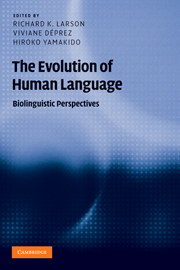Book contents
- Frontmatter
- Contents
- Figures
- Contributors
- Acknowledgments
- Introduction
- 1 The faculty of language: what is it, who has it, and how did it evolve?
- Part I Language architecture
- Part II Language and interface systems
- Part III Biological and neurological foundations
- 9 Plasticity and canalization in the evolution of linguistic communication: an evolutionary developmental approach
- 10 What is language, that it may have evolved, and what is evolution, that it may apply to language
- 11 The creative capacity of language, in what manner is it unique, and who had it?
- 12 Genetics and the evolution of language: what genetic studies reveal about the evolution of language
- Part IV Anthropological context
- Notes
- References
- Index
12 - Genetics and the evolution of language: what genetic studies reveal about the evolution of language
Published online by Cambridge University Press: 05 June 2012
- Frontmatter
- Contents
- Figures
- Contributors
- Acknowledgments
- Introduction
- 1 The faculty of language: what is it, who has it, and how did it evolve?
- Part I Language architecture
- Part II Language and interface systems
- Part III Biological and neurological foundations
- 9 Plasticity and canalization in the evolution of linguistic communication: an evolutionary developmental approach
- 10 What is language, that it may have evolved, and what is evolution, that it may apply to language
- 11 The creative capacity of language, in what manner is it unique, and who had it?
- 12 Genetics and the evolution of language: what genetic studies reveal about the evolution of language
- Part IV Anthropological context
- Notes
- References
- Index
Summary
In this paper, I discuss how genetic studies of language can inform discussions about the evolution of language. Depending on the results of genetic studies, the answer could be that genetic studies have nothing to add to such discussions. I take a more optimistic view and argue that genetic studies can and do provide insights about the evolution of language. The organization of this paper is as follows. I begin with a discussion of the relationship between genetics and the evolution of language, outlining some of the assumptions and limitations that exist about their relationship. I then summarize findings of published behavioral studies and our ongoing twin study of language. I end with a description of current theories about the evolution of language, discussing how results from genetic studies can inform and constrain theories about how human language evolved.
The relationship between the genetics and evolution of language
Variability and the heritability of language
Heritability (h2) is an estimate of the extent to which genetic factors account for the observed (phenotypic) variance in a trait. Heritability estimates provide insight into the extent to which differences in language acquisition and proficiency are due to genetic factors. If these phenotypic differences are largely due to differences in people's genetic endowments, heritability estimates will be high. If these differences are random or are largely due to differences in people's environments, heritability estimates will be low.
- Type
- Chapter
- Information
- The Evolution of Human LanguageBiolinguistic Perspectives, pp. 176 - 190Publisher: Cambridge University PressPrint publication year: 2010
- 1
- Cited by



